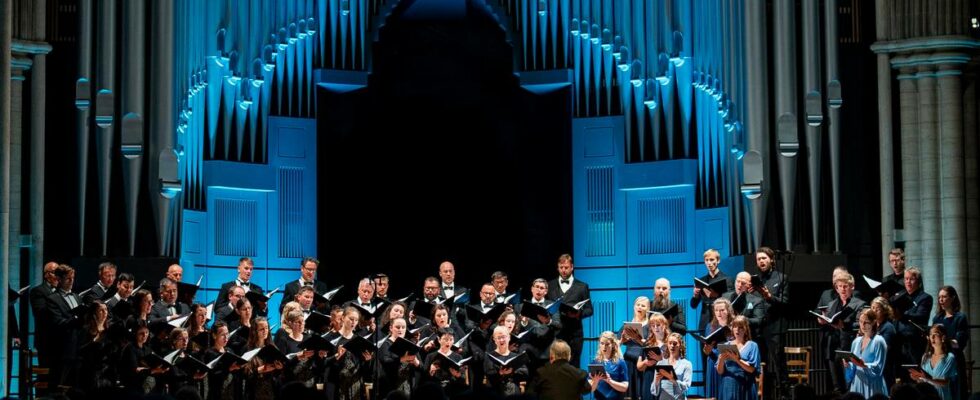The opening concert during Olavsfest has established itself as one of the most distinctive events within the Norwegian festival field. My hope when I enter Nidaros Cathedral is to experience an event that opens a higher sky and draws some longer lines – at the same time that it does not lose its footing in the current affairs of the day. Last year’s opening concert did not quite live up to these expectations. But this year Olavsfest is back where the festival should be. OLD AND NEW: Slovenian Philharmonic Choir and Nidaros Vocal performed classical Rakhmaninov and newly composed Sommerro, conducted by Ragnar Rasmussen. Photo: Ole Martin Wold At this year’s opening concert, an all-cast performance of Sergej Rakhmaninov’s famous “Vespers” was supplemented with Henning Sommerro’s newly written settings of liturgical texts used in Nidaros Cathedral until the Reformation. It is difficult to avoid the experience of a cultural and liturgical union of East and West at a time when the political distance seems insurmountable. In addition, the audience experienced great performances from the Slovenian Philharmonic Choir and Nidaros Vokal, both skillfully conducted by Ragnar Rasmussen. All-night vigil with progress In all its essence, the concert was a performance of one of the main works for choir a cappella: Rakhmaninov’s “Vesper” Op. 37, composed in a war-torn Russia in the winter of 1915. The work is a setting of Church Slavonic texts from the great service which for centuries has been held on the eve of major holidays within the Russian Orthodox Church. FULFILLMENT: The Slovenian Philharmonic Choir convinced in its performance of Sergej Rakhmaninov’s “Halloween Vigil”. Photo: Ole Martin Wold / Olavsfest 10 of the total of 15 movements are based on ancient hymn melodies, while the remaining five use what the composer himself characterized as “deliberate falsifications” of such melodies. The result is an exceptionally rich choral work that presents an almost complete Orthodox-Christian worldview, from creation to resurrection. The demands on the choristers are formidable, not least on the basses, who in some places have to sing in a very deep voice. The Slovenian Philharmonic Choir is a new acquaintance for me, but impressed with precise intonation (with a few exceptions) and a well-balanced sound with a good core in all voice groups. The bass tackled the abysmal B that ends the fifth movement with flying colors. Ragnar Rasmussen led a performance with a lot of momentum, without the expression being rushed. The phrases were allowed to unfold organically, with nice flexibility in tempo. The only thing I missed was an even greater boldness to take selected passages all the way down to pianissimo. EXPERT CONDUCTOR: Ragnar Rasmussen is currently professor of ensemble management at NTNU and was the conductor during the opening concert. Photo: Ole Martin Wold Unredeemed unity In addition, the concert featured newly composed music by Henning Sommerro, the composer whom many associate with an evergreen harmonica melody without knowing that he is a professor at NTNU. Sommerros “Helnattsvake” consists of five relatively short movements. These were performed with mathematical regularity after every third movement in Rakhmaninov by a smaller and separate vocal ensemble, Nidaros Vokal (the two choirs performed a movement from each of the two works together). “Helnattsvake” appeared as expressive and artisanally solid music within a moderately modern tonal language, and was well looked after by the newly founded Nidaros Vokal. However, the way Sommerro was juxtaposed with Rachmaninov never quite convinced me. Partly this is due to the lack of a program text that could have given in-depth information about both the choice of texts and how Sommerro’s works relate to Rakhmaninov, liturgically and musically. SOLID: Nidaros Vokal is a relatively new vocal ensemble consisting of newly graduated singers from NTNU. Photo: Ole Martin Wold / Olavsfest Most of all, it is a stylistic distance between the two works that makes the juxtaposition jarring. Rachmaninov’s music is characterized by long lines in a moderate tonal language that unites romantic harmonics and old church tones. Sommerros is far more breathless, eclectic and rich in contrasts, with an emphasis on extensive repetition of text and short musical motifs. From a purely musical perspective, I would honestly have preferred the two works to be performed separately. Here it appeared as an unresolved attempt to create a unit. The music of power and the power of music “Power” is the theme of this year’s Olavsfest, and the opening concert provided ample opportunities to reflect on the ways in which power is manifested in various domains. Ukrainian cultural institutions have, understandably, banned performances of Russian works while the war against Russia is ongoing. In an article in The Guardian in 2022, Ukraine’s then Minister of Culture urged Western allied countries to do the same. So far, few have advocated canceling a work like Rakhmaninov’s “All Night Vigil”, despite the Russian Orthodox Church’s extensive Putin propaganda after 24 February 2022. The work was performed both during the Oslo Church Music Festival in March this year, and in last year as part of the Bergen Philharmonic Orchestra’s commemoration of Rakhmaninov’s 150th anniversary. The reasons for continuing to perform composers such as Tchaikovsky and Rakhmaninov are obvious. More than ever, we need to promote a view of art that avoids reducing ambiguous and complex works to simple categories of identity politics. The opening concert during this year’s Olavsfest was an important contribution in this respect. news reviews What: Helnattsvake Where: Olavsfest, Nidaros Cathedral Performers: Slovenian Philharmonic Choir, Nidaros Vocal, Ragnar Rasmussen (conductor) List of works: Sergey Rakhmaninov: “Allnattsvake” (“Vesper”), Op, 37Henning Sommerro: “Helnattsvake” (first performance) Published 30.07.2024, at 12.57 Updated 30.07.2024, at 14.43
ttn-69
“All night vigil” by Rakhmaninov and Sommerro at Olavsfest 2024 (opening concert) – Reviews and recommendations

